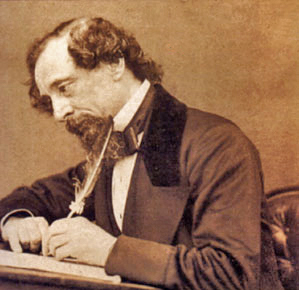What the Dickens! Much Loved Author’s Ties to Auld Reekie
For Dickens visiting Edinburgh which he did often was ‘like coming home’ during his visits to the city he regularly walked up Arthur’s Seat. Edinburgh gave him the ‘Freedom of the City’ before he became well-known around the world. The impoverished living conditions which featured in many of his stories and his campaigning on social issues were inspired by his visits to slums in the Edinburgh’s old town which greatly affected him “we saw more poverty and sickness in an hour than people would believe in, in a life” he spoke of one dwelling in which “lay in an old egg box which the mother had begged from a shop, a little, feeble, wan sick child. With his little wasted face, and his bright attentive eyes, I can see him now, as I have seen him for several years, looking steadily at us.”

At an event organised by Sir Walter Scott in honour of George IV’s visit to Edinburgh the catering contract was won by Ebenezer Lennox Scroggie, who would become the posthumous inspiration for Charles Dickens' character Ebenezer Scrooge in A Christmas Carol when Dickens misinterpreted meal man for mean man. Some of Dickens closest friends including Lord Henry Cockburn and Lord Francis Jeffrey were from Edinburgh. Dickens wife Catherine was also from Edinburgh. This Christmas the BBC showed a wonderful new adaptation of Great Expectations, A Christmas Carol, The Pickwick Papers, Oliver Twist, Nicholas Nickelby and The Old Curiosity Shop are brilliant tales. In the months to come there are sure to be more adaptations of Dickens work as well programmes that pay homage to one of the world’s greatest writers, as next year will be the 200th anniversary of Dickens life. Given Dickens close ties to Scotland and to mark the 200th year anniversary a Dickens tartan would be a fitting tribute. According to Elizabeth Velluet of The Dickens Fellowship Dickens the author’s links with Edinburgh were established in 1834 when he visited the city as a journalist. A few years later following an event in Edinburgh in celebration described as “great public recognition of his genius” after which Dickens delighted by the rapturous reception he has received said “I believe I shall never hear the name of the capital of Scotland without a thrill of gratitude and pleasure. I shall love while I have life her people, her hills, and her houses, even the very stones of her streets.” The Lord Provost, council and magistrates awarded him the freedom of the city. According to his friend and biographer John Foster the parchment scroll of the freedom of the city was one of his most treasured possessions. Dickens’ burgess scroll now resides in the Museum of Edinburgh – returned to the city by Dickens’ grandson in the 1940s – and will go on display next year. “Charles Dickens’ Edinburgh connections are certainly worthy of celebration,” said Edinburgh Deidre Brock. “So to mark next year’s bicentenary, we’ll be putting Dickens’ Freedom of the City ‘burgess ticket’ on proud display. I’m delighted that this anniversary is putting Dickens’ links to Scotland’s capital under the spotlight.”

 Check out our Yopto Reviews
Check out our Yopto Reviews